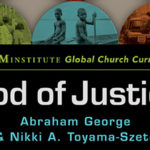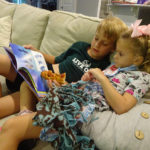WASHINGTON (RNS)—Some religious leaders are turning their ways of living the faith inside out. They’re taking believers into the woods, rivers and deserts to find spiritual truth through adventure and environmental awareness.
 “Backcountry Chaplain” Doug GilmerDoug Gilmer, adjunct professor of teaching at Liberty University and the so-called Backcountry Chaplain, is one.
“Backcountry Chaplain” Doug GilmerDoug Gilmer, adjunct professor of teaching at Liberty University and the so-called Backcountry Chaplain, is one.
“The whole Bible is a book of adventure,” he said. “Look at Abraham, Moses, Paul, setting out into the unknown.”
Gilmer teaches Christian adventure leadership in outdoor ministry as a way to make his students “more aware of, more reliant on, the Creator and his creation.”
Jamie Korngold, the “adventure rabbi” of Boulder, Colo., is another. She has been leading outdoor prayer and life-cycle events since 2001.
Once, when a bar mitzvah boy and his family arrived at the wooded spot where he would read Torah for this Jewish rite of passage, a bear commandeered a tree and was simply not going to move.
The “bear mitzvah” moved instead.
 “Adventure Rabbi” Jamie Korngold“You can talk until you are blue in the face about respect for animals in their world, and being more flexible in your life, but there’s no better lesson than this—the bear wins,” Korngold recalled.
“Adventure Rabbi” Jamie Korngold“You can talk until you are blue in the face about respect for animals in their world, and being more flexible in your life, but there’s no better lesson than this—the bear wins,” Korngold recalled.
Nature offered another vivid lesson to Boulder-area residents this fall when heavy storms brought catastrophic flooding. It was a personal exercise in recognizing humans’ role in climate change, because “the big storms are not God punishing us,” Korngold said. “Judaism gives us a lot of personal responsibility.”
Sign up for our weekly edition and get all our headlines in your inbox on Thursdays
It was the kind of lesson students of outdoor religious experiences could appreciate—perhaps more so than those sitting inside listening to a sermon.
Once you step into the great world, any experience might be an “adventure—any activity with uncertainty, an unknown outcome and risk,” Gilmer said.
 A large black bear sits in a tree at Chautauqua Park in Boulder, Colo., approximately 50 feet from a Bar Mitzvah ceremony in September. (RNS Photo courtesy Jeff Finkelstein)Having grown up in rural northern Michigan, where hunting, fishing and farming were the way of life, Gilmer combines lessons of his master’s degree in natural resource management with his seminary education to teach how the outdoors is “a way to study God.”
A large black bear sits in a tree at Chautauqua Park in Boulder, Colo., approximately 50 feet from a Bar Mitzvah ceremony in September. (RNS Photo courtesy Jeff Finkelstein)Having grown up in rural northern Michigan, where hunting, fishing and farming were the way of life, Gilmer combines lessons of his master’s degree in natural resource management with his seminary education to teach how the outdoors is “a way to study God.”
The connections are not hard to find.
Gilmer cited the Apostle Paul “as the greatest adventurer in all the Bible,” who puts a spiritual spin even on his countless painful misadventures.
But studying God, it turns out, requires close attention to the physical surroundings and the needs of the land.
For example, the Jewish holiday of Tu B’Shevat, a sort of Arbor Day, arrives in the dead of winter in Colorado. Instead of planting trees, Korngold’s congregation plants parsley that will bloom in time to be used on seder plates at Passover.
All tableware at adventure congregation events is recyclable because “you can’t speak about environmentalism while drinking from a Styrofoam cup,” Korngold said.
 Doug Gilmer (back row, far left), who goes by Backcountry Chaplain on his website, poses with Liberty University Adventure Leadership students. (RNS Photo courtesy of Doug Gilmer)It’s a contemporary way to teach the do-not-waste message of Deuteronomy 20:19, which commands people never to destroy fruit trees, even in times of war, she said.
Doug Gilmer (back row, far left), who goes by Backcountry Chaplain on his website, poses with Liberty University Adventure Leadership students. (RNS Photo courtesy of Doug Gilmer)It’s a contemporary way to teach the do-not-waste message of Deuteronomy 20:19, which commands people never to destroy fruit trees, even in times of war, she said.
This approach to expressing Judaism—with lakeside retreats for the High Holy Days, desert hikes for Passover and Sabbath in the woods—is all about “relationship, to the earth, to each other and to God,” said Korngold.
For Jason Zickerman and his family, the adventure approach hit a nerve, infusing every moment with God’s word, awareness of God’s world and your role in it, he said.
In September, as he drove his two boys to the lakeside retreat for Rosh Hashanah, his 8-year-old son looked at the itinerary for the event and called out from the back seat: “This is awesome! Who wouldn’t want to be Jewish?”
But, of course, not all outdoor activities are fun and games. And that’s the whole point.
A blister can lead to a conversation about “the whole idea of suffering,” Gilmer said. A hotspot under a too-heavy backpack can prompt a lesson that “they can’t carry the whole load themselves, they have to bear each other’s burden.”
“Every time we go outside to pray, people feel very directly how they are connected to something greater than themselves, even if they are hyper-rational intellectuals in their daily lives,” Korngold added.
It’s a lesson her congregants are taking to heart.
Stefanie Clarke tried numerous approaches to Jewish expression before finding the adventure group.
“I run every day on the same path, but now, after a retreat with the group, I see it differently,” Clarke said. “I notice things I never did before. I stop, look around and appreciate more. I realize God can be in many moments, many things.”














We seek to connect God’s story and God’s people around the world. To learn more about God’s story, click here.
Send comments and feedback to Eric Black, our editor. For comments to be published, please specify “letter to the editor.” Maximum length for publication is 300 words.